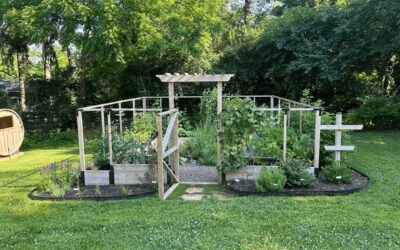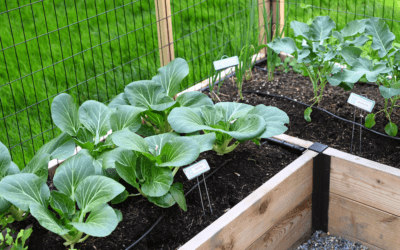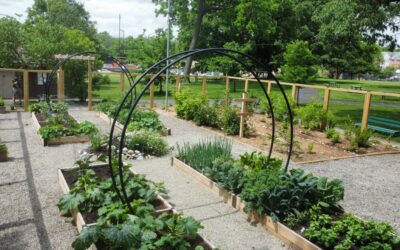Our mission at Backyard Eats is to make growing food at home available and simple to all and be a resource for broadening participation in the homegrown food movement for our clients, employees & community.
The summer gardening season is an exciting opportunity to dive into the art of growing your own food. However, with the high temperatures and humidity of summer come challenges associated with watering, pests, and disease. We aim to shed some light on best practices for managing the challenges of the summer vegetable garden.
Watering Wisdom
Watering your vegetable garden appropriately is essential for success in all seasons. Consistent moisture is key to supporting robust growth and aiding plants in withstanding potential heat stress – especially for young plants. Soil can dry out quickly during summer’s heat, heightening the risk of under-watering and accidental over-watering to compensate. Moreover, high temperatures can induce heat stress in plants, leading to wilting and stunted growth. Signs of under-watering include wilting or curling leaves and dry soil that recedes from the container edges.
Adopt efficient watering techniques, such as drip irrigation, to not only conserve water but also simplify your watering routine, rendering it a more convenient and enjoyable experience. While hand-watering may supplement irrigation during periods of intense heat, be mindful that excess moisture on plant leaves can foster pest and disease proliferation.
Drip irrigation waters plants deeply and consistently near the roots, reducing the work of hand-watering and the risk of fungal diseases caused by wet plant leaves. Drip irrigation systems equipped with timers are particularly useful for raised bed vegetable gardens because they can be programmed to water crops in the morning, when cooler temperatures mean water evaporates less quickly from the soil. Monitor soil moisture levels and adjust watering frequency as necessary to ensure your plants receive the optimal hydration they need to thrive!

Pest Control Strategies
In summer vegetable gardening, common pests include aphids, mites, and beetles among others. Left unchecked, these pests can stunt growth, distort leaves, and defoliate plants, jeopardizing your garden’s vitality. Implement pest management strategies, such as regular monitoring and organic treatments, to pest populations and maintain a healthy garden ecosystem.
We feel that promoting healthy homegrown food is paramount, so we only suggest use of organic pest control methods as needed. Options like neem oil spray or insecticidal soap are safe and effective for combating pests on edible plants. Companion planting can also confer benefits for pest management and plant health; for example, planting marigolds alongside vegetables can deter nematodes and attract beneficial insects. Additionally, incorporating native annual and perennial plants into the landscape surrounding your raised beds fosters a natural ecosystem that appeals to pollinators.
As with any aspect of garden maintenance, regular interaction with your garden is essential to detecting and treating problems early – and also developing a personal connection to your growing space. By promptly identifying and addressing pest issues, you can mitigate damage and maintain a thriving garden throughout the summer season. If you encounter a plant that appears “off,” numerous online resources are available to aid your learning and growth.
Pruning & Disease
Pruning plays a vital role in preventing fungal disease especially in plants like cucumbers, squash and tomatoes. Dense foliage can create a canopy that traps heat and moisture, providing a home for fungus and moisture loving pests. Strategic pruning thins excess foliage, allowing even sunlight penetration and improved air circulation. This will reduce your risk of pests & disease, and make it easier to see when your produce is ready to harvest!

Harvesting Best Practices
Regular interaction with your garden will help you learn the optimal timing for harvesting various crops, ensuring you enjoy homegrown produce at peak freshness. Proper harvesting practices are also a great way to mitigate pest and disease pressure. Fallen or rotting fruits and vegetables are ideal homes for fungal disease and pest reproduction as well as a source of “weeds”. If 100 cherry tomatoes fall in your garden, and volunteer next year, you may be fighting them more than traditional “weeds.” Fallen or rotting fruits should be disposed of in compost, trash or fed to hungry animals.
As you navigate the joys and challenges of summer gardening in your raised bed, remember that every action contributes to a rewarding experience. From the satisfaction of harvesting fresh produce to the simple pleasure of nurturing healthy plants, each aspect of garden maintenance deepens your connection to nature and knowledge as a gardener. By embracing regular garden maintenance practices and their benefits, you can create a flourishing homegrown oasis that brings joy and fulfillment throughout the summer season.
Do you want a backyard garden that’s productive, rewarding, and easy to take care of? At Backyard Eats, we can help make your dream garden a reality! From designing and installing your dream garden to providing ongoing maintenance and education, we promise to help your edible garden succeed.
Book a consultation or contact us today to learn more:



